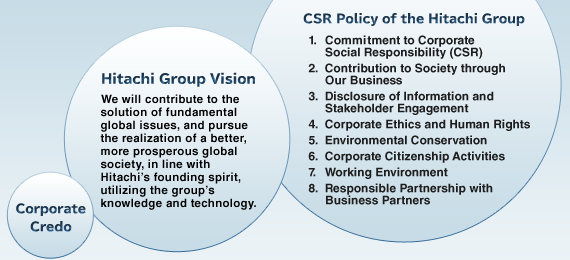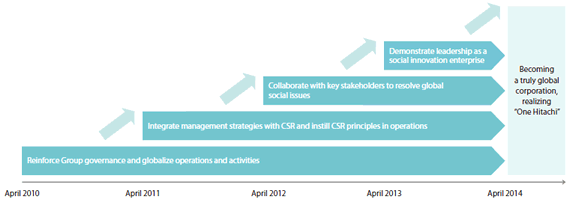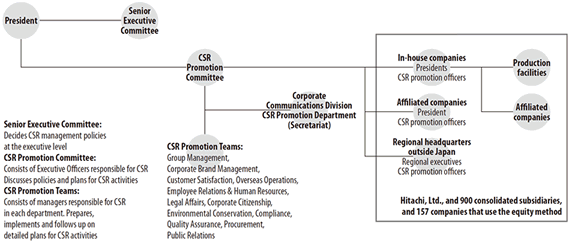production at many plants across Japan. The earthquake caused temporary
shutdowns of electricity, telecommunications, water, and sewage, as well as
other parts of the infrastructure that people take for granted.
The quake deeply affected the global value chain of Hitachi and had
cast doubt on the business continuity planning of Japanese manufacturers. While
many companies waited for the governments and other developmental agencies to
bring back normalcy, Hitachi reinforced its risk and crisis management policies
and immediately changed its priorities, making the country and its people’s
development its topmost focus. The decision was in sync with the vision of the
organization’s founder Namihei Odaira.
‘I want you to contribute more to national (social) progress than
profits,’ Odaira had said in 1935. His statement remains integral to the
company’s corporate credo of ‘contributing to society through the development
of superior, original technology and products,’ and the sentiment is shared
around the globe.
Today, Hitachi is seriously keeping up with its commitment to develop social
infrastructure. The company’s website says that Hitachi is on a mission to help
create safe, secure, and vibrant communities, and that it contributes to
building a social, industrial, and daily life infrastructure that can better
withstand disasters. ‘We will fulfil this mission by focusing on our Social
Innovation Business.’
Celebrating its centennial in 2010, the company talked about its social
activities and claimed contribution to address United Nations Millennium
Development Goals to end poverty and hunger, provide universal education,
combat diseases, and ensure environmental sustainability. The company stated
that it would continue to contribute to a healthy, safe, and comfortable
lifestyle and environment around the globe by drawing on its accumulated
expertise and technologies to produce innovations.
The company website states: ‘Deeply aware that a business enterprise is
itself a member of society, Hitachi is also resolved to strive as a good
citizen of the community towards the realization of a truly prosperous society
and, to this end, to conduct its corporate activities in a fair and open
manner, promote harmony with the natural environment, and engage vigorously in
activities that contribute to social progress.

CSR Policy
The foundation of CSR Policy at Hitachi stands on the following
elements:
Commitment to CSR
The Hitachi Group, including all its executives and
employees, recognizes CSR as a vital part of corporate activity and is,
therefore, committed to a course of social responsibility in accordance with the
CSR policy for sustainable development of society and business.
Contribution to society through business
The Hitachi Group will contribute to the building of a
prosperous and vibrant society by providing safe, high-quality products and
services through business activities based on research, technology, and product
development.
Disclosure of information and stakeholder
engagement
The Hitachi Group will disclose information openly and
transparently in order to maintain and develop a relationship of trust with its
various stakeholders, and act responsibly towards them through various means of
communication.
Corporate ethics and human rights
The Hitachi Group will undertake its business based on
the principles of fairness and sincerity, act with the utmost respect for human
rights, and pursue a high sense of corporate ethics in the global business
market which encompasses diverse cultures, morals, ethics, and legal systems.
Environmental conservation
The Hitachi Group will strive to minimize environmental
effects and utilize resources towards the development of a sustainable society
that is in harmony with the environment.
Corporate citizenship activities
The Hitachi Group will promote social contribution
activities as a good corporate citizen in order to realize a better society.
Working environment
The Hitachi Group will make every effort to create a
pleasant and motivating working environment for all its employees and to fully
support those employees who desire self-fulfilment and self-development through
their work.
Responsible partnership with business
partners
The Hitachi Group will make every effort to promote fair
and sound business practices among their business partners by fostering a
common awareness of social responsibility.

In fiscal 2006, Hitachi produced its three-year CSR
Roadmap, a medium-term plan for CSR activities. The company website says that
the company drew on this roadmap to review its various activities towards
welfare of society from a global perspective, and sought to resolve the resulting
challenges. In fiscal 2009, these efforts were rewarded as the company was
selected to be included in the Dow Jones Sustainability World Indexes (DJSI
World). The company also made the Silver Class in the Sustainability Yearbook
2010 published by Swiss firm Sustainable Asset Management and
PricewaterhouseCoopers.
Hitachi formed a new five-year CSR Roadmap in fiscal 2010. It says that
the company will strive under this initiative to become a truly global
corporation, reinforce the group’s operational foundations, quantitatively
assess its CSR efforts, and function more transparently.

Hitachi’s CSR Roadmap
Involve stakeholders
Hitachi involves its stakeholders in the CSR
decision-making process. The organization engages with them worldwide on key
strategic issues, evaluating global social problems requiring attention from
the perspectives of community and business sustainability. The CSR Promotion
Committee deliberates on matters raised in stakeholder dialogues. This body of
Hitachi executive officers incorporates the most significant issues into CSR
initiatives for subsequent fiscal years and presents information on important
social issues in the Corporate Sustainability Report.
In fiscal 2009, Hitachi representatives met in Brussels
with officials from the European Union, non-governmental organizations, and
socially responsible investors to discuss regional environmental policies and
businesses.

Structure of Hitachi Group CSR
Promotion
CSR self-assessment
tools
Hitachi uses CSR self-assessment tools that it developed
in fiscal 2008 to clarify and strengthen its group-wide CSR initiatives. It
produced an English-language version of the tools in fiscal 2009, testing them
in North America and then supplying them to operations throughout Europe and
Asia.
Fiscal self-assessment
Hitachi’s self-assessment for fiscal 2009 scored higher
than in the previous year, particularly in terms of corporate ethics, human
rights, and procurement. The gains were the fruit of a code of conduct and
procurement guidelines based on the 10 principles of the United Nations Global
Compact as well as efforts to strengthen its compliance system and engage with
external experts. The company aims to boost the score in next fiscal by
bolstering areas including risk management, CSR education, and disclosure.
Topics covered in each
policy of the CSR Self-Assessment Tool

Policy 1: CSR vision; CSR education; risk management
Policy 2: Coordination with business strategies; sustainable
designs; customer satisfaction
Policy 3: Information disclosure; dialogue with stakeholders
Policy 4: Corporate governance structure; awareness of
ethics; compliance; human rights
Policy 5: Carbon management strategies; resource recycling;
ecosystem conservation
Policy 6: Strategic social contribution; participation in
local communities; social enlightenment
Policy 7: Respecting diversity; fulfilling work
environments; work-life balance
Policy 8: CSR procurement; communication with suppliers

